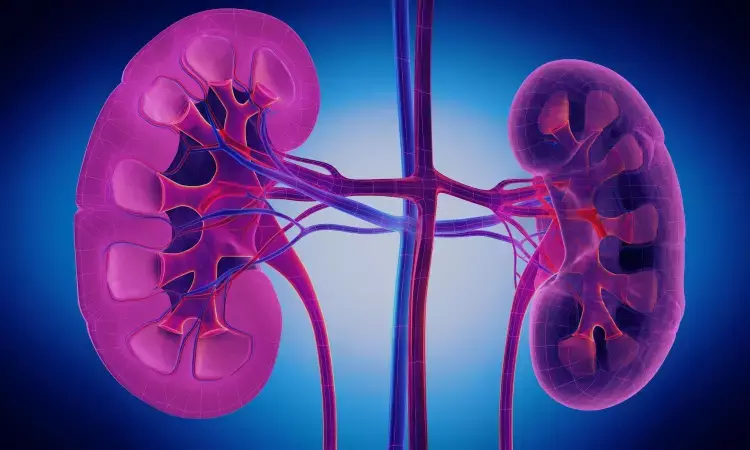- Home
- Medical news & Guidelines
- Anesthesiology
- Cardiology and CTVS
- Critical Care
- Dentistry
- Dermatology
- Diabetes and Endocrinology
- ENT
- Gastroenterology
- Medicine
- Nephrology
- Neurology
- Obstretics-Gynaecology
- Oncology
- Ophthalmology
- Orthopaedics
- Pediatrics-Neonatology
- Psychiatry
- Pulmonology
- Radiology
- Surgery
- Urology
- Laboratory Medicine
- Diet
- Nursing
- Paramedical
- Physiotherapy
- Health news
- Fact Check
- Bone Health Fact Check
- Brain Health Fact Check
- Cancer Related Fact Check
- Child Care Fact Check
- Dental and oral health fact check
- Diabetes and metabolic health fact check
- Diet and Nutrition Fact Check
- Eye and ENT Care Fact Check
- Fitness fact check
- Gut health fact check
- Heart health fact check
- Kidney health fact check
- Medical education fact check
- Men's health fact check
- Respiratory fact check
- Skin and hair care fact check
- Vaccine and Immunization fact check
- Women's health fact check
- AYUSH
- State News
- Andaman and Nicobar Islands
- Andhra Pradesh
- Arunachal Pradesh
- Assam
- Bihar
- Chandigarh
- Chattisgarh
- Dadra and Nagar Haveli
- Daman and Diu
- Delhi
- Goa
- Gujarat
- Haryana
- Himachal Pradesh
- Jammu & Kashmir
- Jharkhand
- Karnataka
- Kerala
- Ladakh
- Lakshadweep
- Madhya Pradesh
- Maharashtra
- Manipur
- Meghalaya
- Mizoram
- Nagaland
- Odisha
- Puducherry
- Punjab
- Rajasthan
- Sikkim
- Tamil Nadu
- Telangana
- Tripura
- Uttar Pradesh
- Uttrakhand
- West Bengal
- Medical Education
- Industry
Both Low and High HGI Levels Linked to Elevated Risk of Diabetic Nephropathy: Study Finds

China: A recent retrospective cohort study published in Diabetes, Metabolic Syndrome and Obesity has revealed a significant U-shaped relationship between the hemoglobin glycation index (HGI) and the risk of developing diabetic nephropathy (DN) in patients with newly diagnosed type 2 diabetes mellitus (T2DM).
The research, led by Dr. Weiyi Zhou from the Department of Nephrology at the Affiliated Changzhou Second People’s Hospital of Nanjing Medical University, analyzed data from 1,050 patients with T2DM who had normal kidney function at the study's outset. Patients were categorized into quartiles based on their HGI values, and the DN incidence was monitored over time.
The HGI reflects the discrepancy between a patient’s actual HbA1c level and the value predicted from their fasting plasma glucose (FPG), offering insight into individual variations in hemoglobin glycation. Unlike FPG or HbA1c alone, which showed no significant association with DN risk in this study, HGI emerged as a more informative marker.
The key findings of the study were as follows:
- Both very low and very high Hemoglobin Glycation Index (HGI) values were associated with an increased risk of developing diabetic nephropathy (DN).
- The lowest risk of DN was observed at an HGI value of −0.648.
- Patients in the highest HGI quartile had a 54% higher risk of DN (OR: 1.54).
- Those in the lowest HGI quartile showed a 40% increased risk of DN (OR: 1.40), although this was not statistically significant.
- Fasting plasma glucose and HbA1c were not independently associated with DN risk.
- HGI appeared to be a more sensitive indicator for assessing DN risk compared to traditional glycemic markers.
- Subgroup and sensitivity analyses confirmed the consistency of the U-shaped association across different patient groups.
- Inflammation was identified as a potential mechanism in the HGI-DN link, with C-reactive protein (CRP) mediating 11.1% of the association.
- These findings suggest a role for low-grade inflammation in the progression of DN among T2DM patients.
While the findings are compelling, the authors acknowledged several limitations. Being a single-center, retrospective study, it cannot establish causality. The reliance on baseline HGI values alone limited the ability to examine how changes over time might affect DN risk. Additionally, the absence of inflammatory markers beyond CRP and the lack of glycemic variability data, such as MAGE and CONGA, restricted deeper mechanistic insights.
Despite these limitations, the research provides the first evidence of a nonlinear, U-shaped association between HGI and diabetic nephropathy risk in newly diagnosed T2DM patients. According to the authors, incorporating HGI into clinical evaluations may enhance risk prediction and pave the way for more personalized interventions.
"Further multicenter prospective studies, incorporating inflammatory and glycemic variability markers, are needed to validate these findings and assess whether modifying HGI can improve renal outcomes in T2DM," the authors concluded.
Reference:
Zhou W, Zhang L, Liu T. Association Between the Hemoglobin Glycation Index (HGI) and Risk of Diabetic Nephropathy: A Retrospective Cohort Study. Diabetes Metab Syndr Obes. 2025;18:1859-1872. https://doi.org/10.2147/DMSO.S523442
Dr Kamal Kant Kohli-MBBS, DTCD- a chest specialist with more than 30 years of practice and a flair for writing clinical articles, Dr Kamal Kant Kohli joined Medical Dialogues as a Chief Editor of Medical News. Besides writing articles, as an editor, he proofreads and verifies all the medical content published on Medical Dialogues including those coming from journals, studies,medical conferences,guidelines etc. Email: drkohli@medicaldialogues.in. Contact no. 011-43720751


